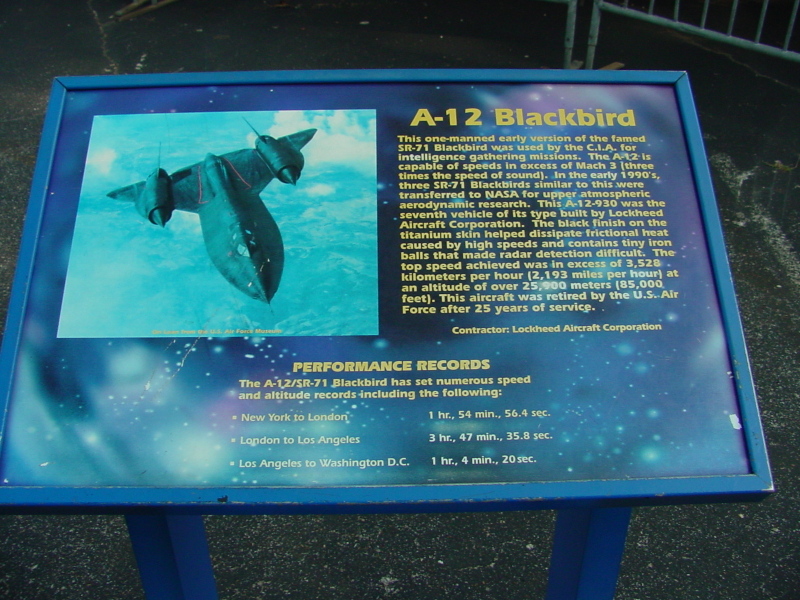| Prev |
heroicrelics.org U.S. Space & Rocket Center Site Index A-12 Gallery |
Next |
dsc00157.jpg
The sign accompanying the A-12. It reads
A-12 Blackbird
This one-manned early version of the famed SR-71 Blackbird was used by the C.I.A. for intelligence gathering missions. The A-12 is capable of speeds in excess of Mach 3 (three times the speed of sound). In the early 1990s, three SR-71 Blackbirds similar to this were transferred to NASA for upper atmospheric aerodynamic research. This A-12-930 was the seventh vehicle of its type built by Lockheed Aircraft Corporation. The black finish on the titanium skin helped dissipate frictional heat caused by high speeds and contains tiny iron balls that made radar detection difficult. The top speed achieved was in excess of 3,528 kilometers per hour (2,193 miles per hour) at an altitude of over 25,900 meters (85,000 feet). This aircraft was retired by the U.S. Air Force after 25 years of service.
PERFORMANCE RECORDS The A-12/SR-71 Blackbird has set numerous speed and altitude records including the following: New York to London 1 hr., 54 min., 56.4 sec. London to Los Angeles 3 hr., 47 min., 35.8 sec. Los Angeles to Washington D.C. 1 hr., 4 min., 20 sec.
Historically, the USSRC has seemed to like calling its aircraft an "A-12 Blackbird," even though the name "Blackbird" is more generally associated with the SR-71. Although the entire family of related aircraft (A-12, YF-12, and SR-71) is sometimes collectively referred to as "Blackbird," the CIA program under which the A-12 was developed was called "Oxcart" (or in all caps, "OXCART"), and the A-12 itself seems to generally be called the "A-12 Oxcart." In fact, the CIA would have you call the entire series of aircraft "the OXCART family."
I mentioned this to the current museum curator, who agreed with my frustration regarding the plane's inaccurate signage. He further assured me that, once it's in its new home, there will be "correct designation and call sign for the aircraft in its interpretive signage." Since that time, I've seen "A-12 Oxcart" T-shirts in the museum gift shop, which I attributed directly to the curator.

| Time picture taken | Sat Jul 27 08:51:15 2002 |
| Location picture taken |
Upper (North) Lot/Drive U.S. Space & Rocket Center Huntsville, AL |
| Prev |
heroicrelics.org U.S. Space & Rocket Center Site Index A-12 Gallery |
Next |